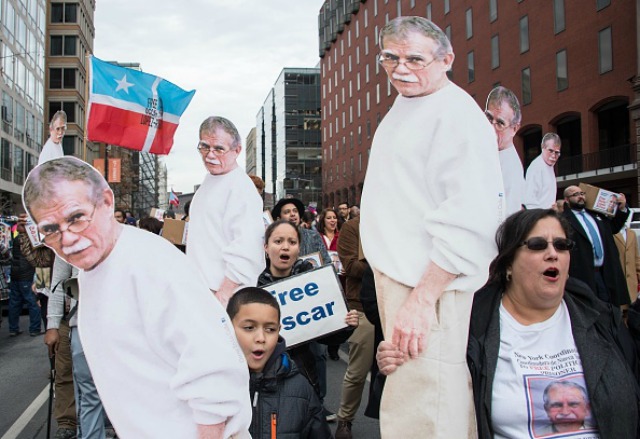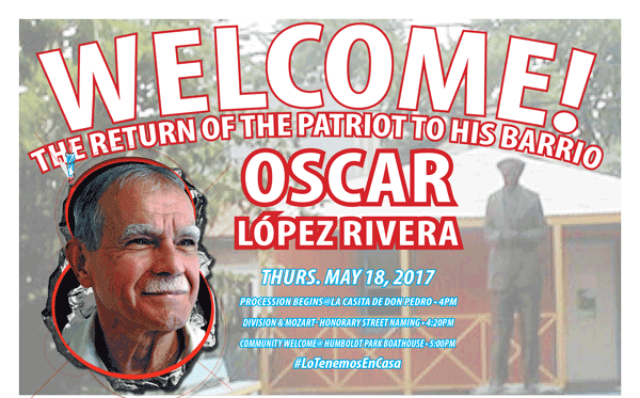'Terrorist,' Or 'Freedom Fighter?' Oscar Lopez Rivera, Now Free, To Be Celebrated At Chicago Return
By Stephen Gossett in News on May 17, 2017 2:28PM

Demonstrators near the White House demand the release of Oscar Lopez Rivera / Getty Images / Photo: Nicholas Kamm
Hamilton creator Lin-Manuel Miranda said he sobbed with gratitude in January at the news that Puerto Rican nationalist Oscar Lopez Rivera's sentence was commuted by former President Barack Obama after 35 years in prison. Meanwhile, Joseph Connor, the son of a victim of a bombing orchestrated by FALN—the nationalist group with which Lopez Rivera was associated—recently derided Lopez Rivera as a "terrorist thug." Needless to say, opposing views of the man represent more than a disparity—they are a gulf.
The mood will be decidedly in the Miranda camp on Thursday, when Lopez Rivera—who was officially released from house arrest in Puerto Rico today—returns to the Humboldt Park neighborhood where he came of age and which, by and large, now reveres him, sporting murals in his honor along parts of Paseo Boricua. During the homecoming event in Humboldt, called “The Patriot Returns to His Barrio," he'll be joined by the likes of Rep. Luis Gutierrez (D-IL) and Ald. Roberto Maldonado (26th). A somewhat controversial honorary street will be dedicated at Division and Mozart.

Until his clemency, Lopez Rivera was in prison since 1981 for "seditious conspiracy" related to ties with the Fuerzas Armadas de Libercaion Nacional (FALN)—a paramilitary group that advocated for an autonomous Puerto Rico. Five people were killed and dozens were injured in bombings across multiple cities, including Chicago, for which FALN either took responsibility or was accused of. He was also charged with use of force to commit robbery and interstate transportation of firearms and ammunition to aid in the commission of a felony. Lopez Rivera received an additional 15 years on his sentence over an escape attempt.
But his supporters have long viewed him as a political prisoner. "My brother was charged with the same charge as Nelson Mandela," his brother Jose Lopez, who is also executive director of the Puerto Rican Cultural Center, told Chicagoist. The nature of a conspiracy charge opened the door for a variety of circumstantial evidence against Lopez Rivera, Jose said. "My brother was not charged with a single incident in which anyone died or suffered... there's not a shred of evidence that links my brother to where blood was spilled."
A death penalty punishment would have been handed down had direct evidence existed, Jose Lopez said. But beyond the legal dispute, Jose Lopez is quick to mention his brother's robust community work as defense. "When people speak about him being a terrorist, they must look at this legacy of community building," he said.
Lopez Rivera returned from the Vietnam War and was a driving force for Puerto Rican activism in Chicago, following the Division Street riots of June, 1966, which served as a flashpoint for the movement. "It was against the injustice, mistreatment and marginalization of Puerto Ricans in the city by every major institution," Jose Lopez said.
Jose runs down a litany of education reforms and programs in which Lopez Rivera was instrumental—Latin American Recruitment and Educational Services (LARES), the Latin American and Latino Studies Program and the Latino Cultural Center (the first of its kind in Illinois) at the University of Illinois in Chicago. He mentions Lopez Rivera's struggle against the Board of Education to help establish the Roberto Clemente Community Academy to better serve Puerto Rican and ESL students.
Lopez Rivera also worked to improve working conditions for Puerto Rican community, enhance housing and improve hospital conditions during his time in Chicago, supporters have also long noted.
Still, despite that resume of civic engagement, Lopez Rivera's link to FALN remain a deal-breaking bridge too far—from opinion-page writers to neighborhood listserv regulars and beyond. Critics often point to a 1999 House report that states, in 1976, a bomb-making shop was found by Chicago police in a residence linked to Lopez Rivera. And time passed and a present-day lack of danger posed still don't wipe out the bad taste in some mouths. Columnist Charles Lane wrote in a commentary that ran on the Chicago Tribune website:
"True, the 74-year-old probably no longer threatens the community; and yes, 35 years is a long time, perhaps even "a sufficient amount of time," as a senior administration official put it. Lopez Rivera served honorably in Vietnam before undergoing what today might be called "self-radicalization."Still, unconditional release, for someone who claimed a right to wage war on the United States and repeatedly put innocent civilian lives at risk?"
But for advocates like Gutierrez—and those who remember Chicago's treatment of Puerto Ricans ahead of the Humboldt Park riots in 1966 as deeply neglectful—the apt comparison remains Mandela—"a leader labeled a terrorist and jailed because he fought for the liberation and self-determination of his people."
A procession on Thursday begins at La Casita de Don Pedro (2625 W. Division St.) at 4 p.m. The street-sign dedication takes place at 4:20 p.m., and a community welcome is scheduled for 5 p.m. at the Humboldt Park Boathouse.